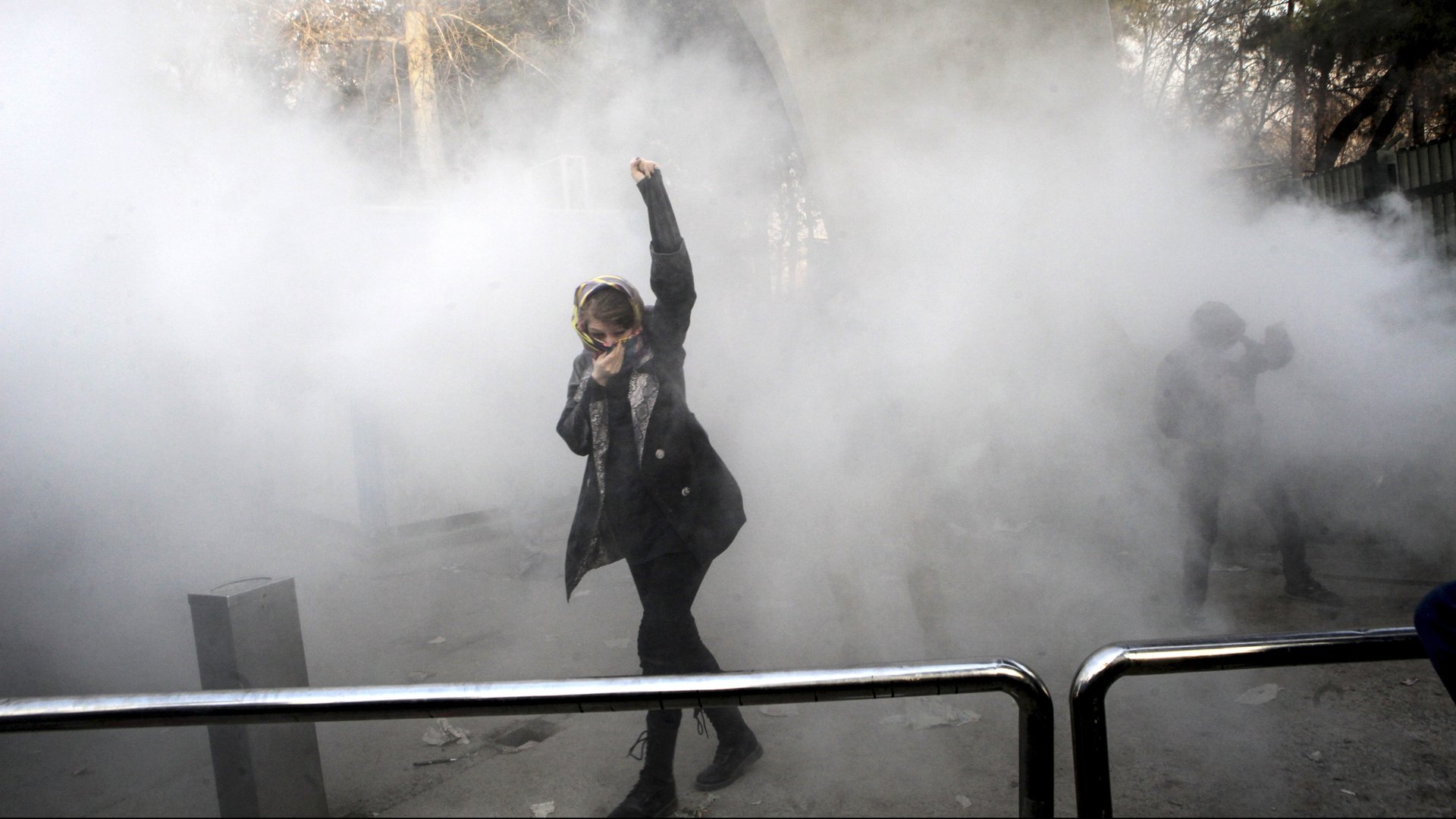Four social media posts foreshadow 2018’s impending political crises
In a less-than-happy New Year’s message, the political-risk analysis firm Eurasia Group says 2018 might well be “the geopolitical equivalent of the 2008 financial meltdown.”


In a less-than-happy New Year’s message, the political-risk analysis firm Eurasia Group says 2018 might well be “the geopolitical equivalent of the 2008 financial meltdown.”
The firm warns (pdf, p. 2) of a parcel of threatening-sounding issues to watch out for, from “global tech cold war” to “erosion of institutions.”
Indeed, if recent social media activity is any indicator, the months ahead will be tumultuous: At least four posts in the past few days have generated intense reactions, ranging from street protests in Iran to fears of renewed conflict in the Middle East.
On Facebook, a Palestinian girl was shown slapping an Israeli soldier
Only 16, Ahed Tamimi has risen to the status of hero in the Palestinian community after a video, first spread by Israeli hardliners, showed her slapping an Israeli soldier in the face in the occupied West Bank. It went viral on Facebook on Dec. 18 and now has more than a million views.
Reactions worldwide heightened tensions in a conflict that had already been stirred up in recent weeks by Donald Trump’s decision to move the US embassy to Jerusalem.
Tamimi, hailed by anti-occupation activists as the West Bank’s Joan of Arc, is now in Israeli custody, charged with assault and with throwing stones, a charge resulting from past episodes. Her mother, who reportedly filmed and shared the episode, was also charged with assault and incitement. Some Israelis want to make an example of the teen, demanding life imprisonment. She is the daughter of an activist who has demonstrated against the occupation. Palestinians see Tamimi as a freedom fighter, with her arrest the latest symbol of the lengths Israel will go to in the occupied territories.
On Snapchat, a mob was filmed “lynching” a policewoman
Early on New Year’s Eve in the Paris suburb Champigny-sur-Marne, a crowd attacked a policewoman who was part of unit answering an emergency call to disperse a group that refused to leave an overcrowded club event. After the police used tear gas, two officers became isolated and were targeted by a mob. In the video, first shared on Snapchat and then circulated through other platforms, the woman officer is thrown to the ground, kicked and beaten, in what president Emmanuel Macron called a “cowardly and criminal lynching.”
While some in the ruling French political class called for the need to end the culture of violence and ghettoization seen as ulitmately responsible for such episodes, the populist far-right was quick in linking the crime to the need for tougher security and more strength in law enforcement. The sentiment was echoed by conservatives in other countries, including the UK and US, who saw the incident as further reason to promote tougher borders and xenophobia, in what is likely to be a political leitmotif for 2018—as it was in 2017.
In Iran, posts shared on Telegram inspired street protests
The cost of daily goods has been going up steadily in Iran, with eggs prices rising 50% in a short span. Information and memes about the hikes circulated through the messaging app Telegram, which counts 40 million users in the country, together with calls to end Islamic religious rule. The protests are the largest since 2009, when people mobilized against the re-election of president Mahmoud Ahmadinejad. These protests appear to be widespread and reflect unhappiness with the whole political establishment.
Videos and images of the protests, which began in Mashhad on Dec. 29 and then spread, have been shared via Telegram and Instagram, and both services have been cut off by the government, as citizens fear losing access to the Internet altogether. So far, however, Global Voices report, access remains available and news has been circulating within and outside the country. Trump commented with a tweet that read like a campaign message.
The president of the US started the year by threatening Pakistan on Twitter
Only about 12 hours after his first tweet of 2018 (celebrating his success in “making America great again”), Trump began addressing foreign policy through his favorite medium, taking on a somewhat unexpected target: Pakistan.
The president’s condemnation of Pakistan sent the international community into a bit of a panic. While Pakistan and US have had some rocky moments over the country’s handling of Taliban terrorists, Trump’s words brought the discussion to a much more confrontational level. The Pakistani foreign minister asked the US ambassador in Islamabad to explain, and Shahid Khaqan Abbasi, Pakistan’s prime minister, called an emergency meeting with foreign affairs and military consultants.